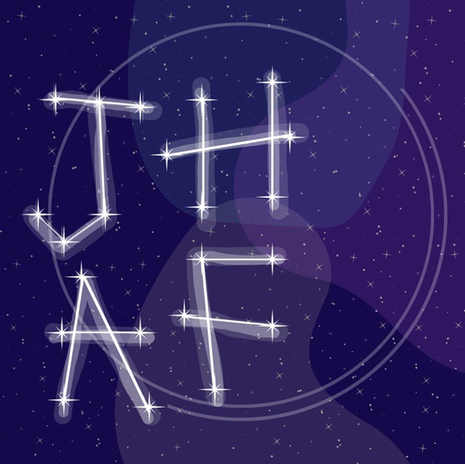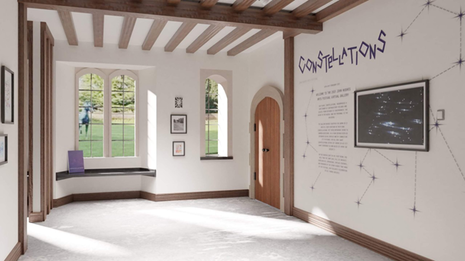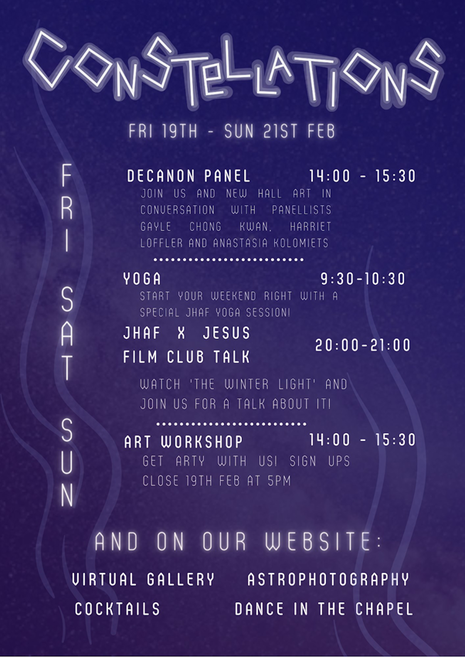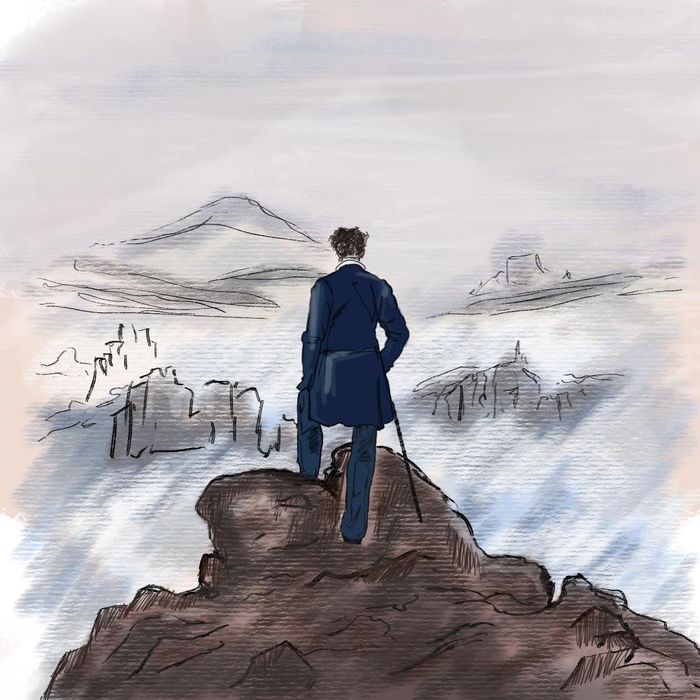Uplifting, Joyful and Informative: An Interview with the Directors of the John Hughes Arts Festival
Izzie Glover speaks to the directors of the JHAF about maintaining the spirit of such a communal, celebrated festival across a digital format

Halfway through an online Lent term, the prospect of another 4 weeks of groundhog days seemed bleak until I spoke to Olivia Emily and Posy Putnam, directors of this year’s John Hughes Arts Festival. The pair and their virtual gallery team have worked hard to transfuse the spirit of Jesus College’s well-loved arts festival into a virtual format, treading a thoughtful approach to everything from the theme to the events planned. Their respectful strategy is appropriate given that the JHAF was founded in memory of the late and much-loved Dean John Huges. Olivia and Posy stress the importance of coming together, if only virtually, for this weekend of celebrations. The festival begins this Friday (the 19th) and runs until Sunday (the 21st); it looks to be a truly uplifting, informative, and joyful experience.
The form of this year’s festival has been shaped by the pandemic – was the pandemic at the forefront of your mind when you were picking the theme of constellations?
“we kept returning to these ideas of connections, relationships, closeness”
OE: Our vision for JHAF 2021 was very much inspired by coming (back) together. We had a full committee meeting to decide on the theme, and we kept returning to these ideas of connections, relationships, closeness. ‘Constellations’ felt like the most poetic rendition of these thoughts. I think we’re all a little interested in space and the unknown — or perhaps how we can read and interpret the stars to make things known — so I think rather than ‘constellations’ being a product of our pandemic times, our times can be read into ‘constellations’; in other words, ‘constellations’ gathers more depth when read through a pandemic-tinted filter. So the theme is very relevant to the new world we’re living in, but I also think it’s a timeless concept, and that’s why we loved it so much – the versatility of stars and space is very fruitful.
PP: Liv and her words (which are far more eloquent than mine would ever be) have pretty much covered it all and I totally agree!
The most striking and far-reaching element of the festival is the Open Hang Gallery. What can you tell me about the logistics and organisation of creating the virtual exhibition?
OE: For the gallery, we owe a lot to our incredible gallery team. Bogged down with a bit of lockdown exhaustion, I personally (and pessimistically) envisioned a wordpress site (or similar) scraped together by Posy and I with a series of photos of art submitted to us. But when we met with the gallery team, they were bubbling with ideas. Toby and Rose had a vision for this virtual gallery, and they’d already been in touch with a company — V21 Artspace — who were willing to bring this vision to life.
PP: V21 Artspace have been absolutely incredible throughout! As a student-run non-profit festival in memory of a beloved member of Jesus College, they were willing to create a virtual gallery for us at-cost, in just over a month. What’s more, they’ve even managed to replicate the Marshall Room – where the gallery took place last year – complete with wooden beams and shots of the Jesus horse through the windows!

In lieu of in-person activities, you are hosting a wonderfully broad range of events that include a decolonising art panel, yoga, an art workshop, and a film club. How did your individual interests help in choosing and creating these events?
PP: Our main wish for the events card was to cover a broad range of art as well as creating events that people can truly engage with. There’s a JHAF tradition of ‘jazz brunch’ that usually occurs on the Saturday of the festival; for obvious reasons we unfortunately cannot host one this year, but yoga will replace it in spirit. The art workshop and film talk are pretty traditional ideas that we’re excited to transform online (and still be able to host!).
OE: The ‘decanon’ panel is especially exciting because we’re able to host people who wouldn’t necessarily all be in Cambridge at the same time if the festival were in person. It’s such an important topic at the moment, and our team have worked really hard to bring a range of perspectives to the table. We can’t think of a better event to launch the festival!
So many elements of the festival have had to change since last year’s festival. What have you learnt from taking the reins of a festival during such an unpredictable time?
OE: We’ve definitely learned the importance of having an online presence! More than anything, we’ve learned versatility and creativity. Last year, we heavily reduced printing for environmental reasons, and so to have a festival zine is a really exciting and unique part of the new online JHAF experience.
PP: I can sometimes be a bit pessimistic and am very much a prepare-for-the-worst sort of person, so I was really pleasantly surprised by how so many people outside the festival committee were prepared to jump in and help out! Everyone we’ve spoken to has been really keen to see a virtual festival take place, and we’ve received encouragement, technological support (the mere existence of a JHAF website owes a lot to Jacob Powell, the JCSU President), and JCSU funds to help make it happen.
“I hope that a couple of people who check out the gallery or a virtual event on a whim will have fun and realise that “the arts” don’t have to be this really exclusive thing”
You’ve balanced the serious and the fun in your planned events, from the panel to JHAF themed cocktails – what do you hope people will take away from these virtual events?
OE: JHAF is such a big part of college life at Jesus and our launch night last year attracted hundreds of people. That kind of buzzing, exciting experience is difficult to recreate, but we’re hoping to create a form of togetherness this year — the kind of shared experience we’ve been so deprived of recently.
PP: I hope that a couple of people who check out the gallery or a virtual event on a whim will have fun and realise that “the arts” don’t have to be this really exclusive thing where you must know everything about some obscure film director or painter to be accepted. I hadn’t really considered myself a “creative” or “arty” person since I finished GCSE Art, and hadn’t been involved in the Cambridge arts scene much before the festival, but JHAF has been a really lovely way to reconnect with that side of myself in the midst of a busy and stressful Cambridge term.

Lastly, how has planning this festival impacted you? Will you be sad to part ways with it once it is over?
OE: I am a very productive procrastinator, so I usually fill my time between essays with extracurriculars. Now that most have sadly ceased to exist, JHAF has given me a sense of normality and purpose. JHAF 2020 was one of the last in-person events I experienced before the pandemic, so it will always have a special place in my heart. It’s a shame that JHAF can’t happen in person this year, but the virtual rendition of the Marshall Room is so accurate and beautiful that it feels like a great substitute. Hopefully having the virtual gallery depict such a central space in college will remind many college members of last year’s festival, as well as bringing back memories of Cambridge for those of us who are at home. I’m also just really excited for the events we’re hosting, especially the art workshop!
PP: It feels like a nice send off to Cambridge — a way to give back to the community in my final year. It has been far less stressful than I expected, thanks to our amazing and very much on-it-at-all-times committee, so organising JHAF has given me some time to reflect and reminisce about my time at university through the medium of art.
The John Hughes Arts Festival begins this Friday (19th) with a Decolonising Art panel. For more information look on the website and the Facebook page.
 Interviews / You don’t need to peak at Cambridge, says Robin Harding31 December 2025
Interviews / You don’t need to peak at Cambridge, says Robin Harding31 December 2025 News / Unions protest handling of redundancies at Epidemiology Unit30 December 2025
News / Unions protest handling of redundancies at Epidemiology Unit30 December 2025 Comment / What happened to men at Cambridge?31 December 2025
Comment / What happened to men at Cambridge?31 December 2025 Features / ‘Treated like we’re incompetent’: ents officers on college micromanagement30 December 2025
Features / ‘Treated like we’re incompetent’: ents officers on college micromanagement30 December 2025 Theatre / We should be filming ADC productions31 December 2025
Theatre / We should be filming ADC productions31 December 2025









